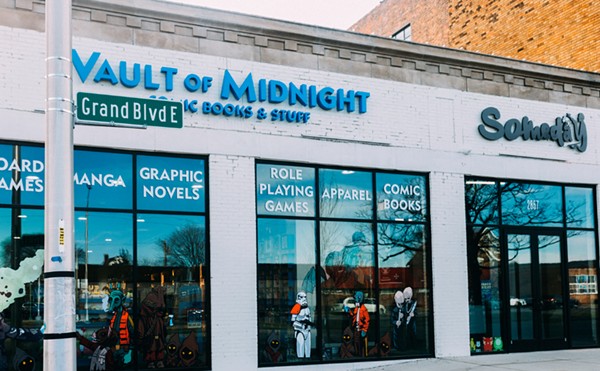bad•ass ('bad-as) Slang (vulgar). adj. 1 : (Of a person) difficult to deal with; mean-tempered; touchy. 2 : Distinctively tough or powerful; so exceptional as to be intimidating. n. 3 : A mean-tempered troublemaker.
That’s the dictionary definition of “badass.” But writer, director and actor Melvin Van Peebles patented his own definition of the word more than 30 years ago with a film that debuted and found its first success in Detroit’s own Grand Circus Theatre, a film that later generations of filmmakers acknowledge as the big daddy of independent black cinema: Sweet Sweetback’s Baad Asssss Song.
Over cups of coffee recently, the 71-year-old Van Peebles recounts, “When I asked Spike [Lee], and then I asked the Hudlin brothers and then I asked a number of the young black filmmakers, ‘How did you get started?’ [they say] ‘I saw Sweetback.’”
Now, with Baadasssss!, Melvin’s son, Mario Van Peebles, writes, directs and stars in a story about his father and the obstacles he faced in making his films. Baadasssss! opens this weekend at Royal Oak’s Main Art Theatre (see review).
The younger Van Peebles says he faced problems with studio execs in making Baadasssss! similar to the issues his father confronted decades ago. Mario says the studio worried that his biopic might be “too sexy, too political.” They asked if he “could make Melvin more nice and more likable.”
“To take those notes would be marginalizing his spirit,” Mario explains of his father’s character. “It’s obvious that the suits didn’t have a clue about the definition of badass.”
It’s crystal-clear that Mario does. In breaking down the issue of producing progressive black films for major studios, Mario says, “The studios and the commerce machine ... tend to dilute the revolutionary core ... they tend to send out the icing without the cake.”
Spoken like a Hollywood radical? Maybe. Mario is far from being a studio house nigger. He originally titled his film How to Get the Man’s Foot Outta Your Ass, and his characterization of his father is as cantankerous and irascible as any tough brother could hope to be.
When I ask the senior Van Peebles about his cinematic beginnings, Melvin responds, “I taught myself. I made three short films. I went out to Hollywood with my films looking for a job ... and they offered me a job as an elevator operator. ‘No, no, you don’t understand. I want to write and direct ... be in the creative mix.’ So they offered me a job as a dancer. ‘Y’all ain’t gettin’ it!’ But then they explained to me that you could tell right away if a person had qualities that made him a good director and I didn’t have those qualities.”
What were those qualities? “Being white,” Melvin answers.
He went to Europe. In 1967, he returned to America as the French delegate to the San Francisco Film Festival, with his French director’s card in his pocket and his résumé including a Ph.D. in celestial mechanics from a college in Holland, a stint as a crime reporter in Paris and five novels published in French. He landed in the stark reality of late 1960s America, a place erupting in race riots.
Baadasssss! picks up Melvin’s story in 1970 as he struggles to complete his first Hollywood feature film, The Watermelon Man, part of a three-picture deal with Columbia. But Columbia had problems with the film, a wry racial satire about a white bigot (played by Godfrey Cambridge) who wakes up black. The studio felt that the film’s black-like-me experience should have been presented in the end as being just a nightmare.
Van Peebles refused the change, so Columbia gave him the boot. When he was creating Sweetback, he faced similar issues with potential white investors, intimidated by the story: Sweetback performs live sex acts in a club. A corrupt white cop calls the shots. When a white woman in the audience volunteers to sample Sweetback’s sexual prowess, the plain-clothes officer vetoes her offer with a shake of his head.
When Sweetback witnesses two policemen brutalizing a black revolutionary, he becomes black cinema’s first action hero, taking one of the cops’ guns and blowing both of them away. It’s a “by any means necessary” move as Sweetback becomes the personification of Black Panther Party ideology: Distinctly tough, powerful and intimidating, a mean-tempered troublemaker who won’t sit down for the Man.
Sweetback’s shots continue to echo through black American popular culture, from so-called blaxploitation cinema of the 1970s to rap songs like N.W.A.’s “Fuck tha Police,” and within the gangsta rap of today.
Ironically, Baadasssss! reveals that Sweetback was made by a rainbow coalition of crew members who forged a relationship that had more to do with the philosophy of Martin Luther King than the Panthers. Mario spells it out: “Either we learn to live and work together as brothers and sisters or we die together. Not so much as making a film, but standing up for an idea.”
But it’s Melvin, “The Original Baadasssss” (so reads the logo on his T-shirt), who offers the final lesson, difficult and troublesome only in its execution: “You can do it yourself. You can do it yourself. You don’t have to have the Man help you count your money. You can do it yourself.”
James Keith La Croix writes about film for Metro Times. E-mail [email protected]




